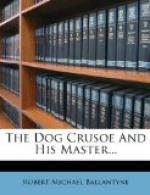Crusoe’s rage instantly vanished on beholding this, and he seemed to be filled with tumultuous joy at his master’s escape, for he gambolled round him, and whined and fawned upon him in a manner that could not be misunderstood.
“Good dog; thank’ee, my pup,” said Dick, patting Crusoe’s head as he stooped to brush the dust from his leggings. “I don’t know what would ha’ become o’ me but for your help, Crusoe.”
Crusoe turned his head a little to one side, wagged his tail, and looked at Dick with an expression that said quite plainly, “I’d die for you, I would—not once, or twice, but ten times, fifty times if need be—and that not merely to save your life, but even to please you.”
There is no doubt whatever that Crusoe felt something of this sort. The love of a Newfoundland dog to its master is beyond calculation or expression. He who once gains such love carries the dog’s life in his hand. But let him who reads note well, and remember that there is only one coin that can purchase such love, and that is kindness. The coin, too, must be genuine. Kindness merely expressed will not do, it must be felt.
“Hallo, boy, ye’ve bin i’ the wars!” exclaimed Joe, raising himself from his task as Dick and Crusoe returned.
“You look more like it than I do,” retorted Dick, laughing.
This was true, for cutting up a buffalo carcass with no other instrument than a large knife is no easy matter. Yet western hunters and Indians can do it without cleaver or saw, in a way that would surprise a civilized butcher not a little. Joe was covered with blood up to the elbows. His hair, happening to have a knack of getting into his eyes, had been so often brushed off with bloody hands, that his whole visage was speckled with gore, and his dress was by no means immaculate.
While Dick related his adventure, or mis-adventure, with the bull, Joe and Henri completed the cutting out of the most delicate portions of the buffalo—namely, the hump on its shoulder—which is a choice piece, much finer than the best beef—and the tongue, and a few other parts. The tongues of buffaloes are superior to those of domestic cattle. When all was ready the meat was slung across the back of the pack-horse; and the party, remounting their horses, continued their journey, having first cleansed themselves as well as they could in the rather dirty waters of an old wallow.
“See,” said Henri, turning to Dick and pointing to a circular spot of green as they rode along, “that is one old dry waller.”
“Ay,” remarked Joe; “after the waller dries, it becomes a ring o’ greener grass than the rest o’ the plain, as ye see. Tis said the first hunters used to wonder greatly at these myster’ous circles, and they invented all sorts o’ stories to account for ’em. Some said they wos fairy-rings, but at last they comed to know they wos nothin’ more nor less than places where buffaloes wos used to waller in. It’s often seemed to me that if we knowed the raisons o’ things, we wouldn’t be so much puzzled wi’ them as we are.”




